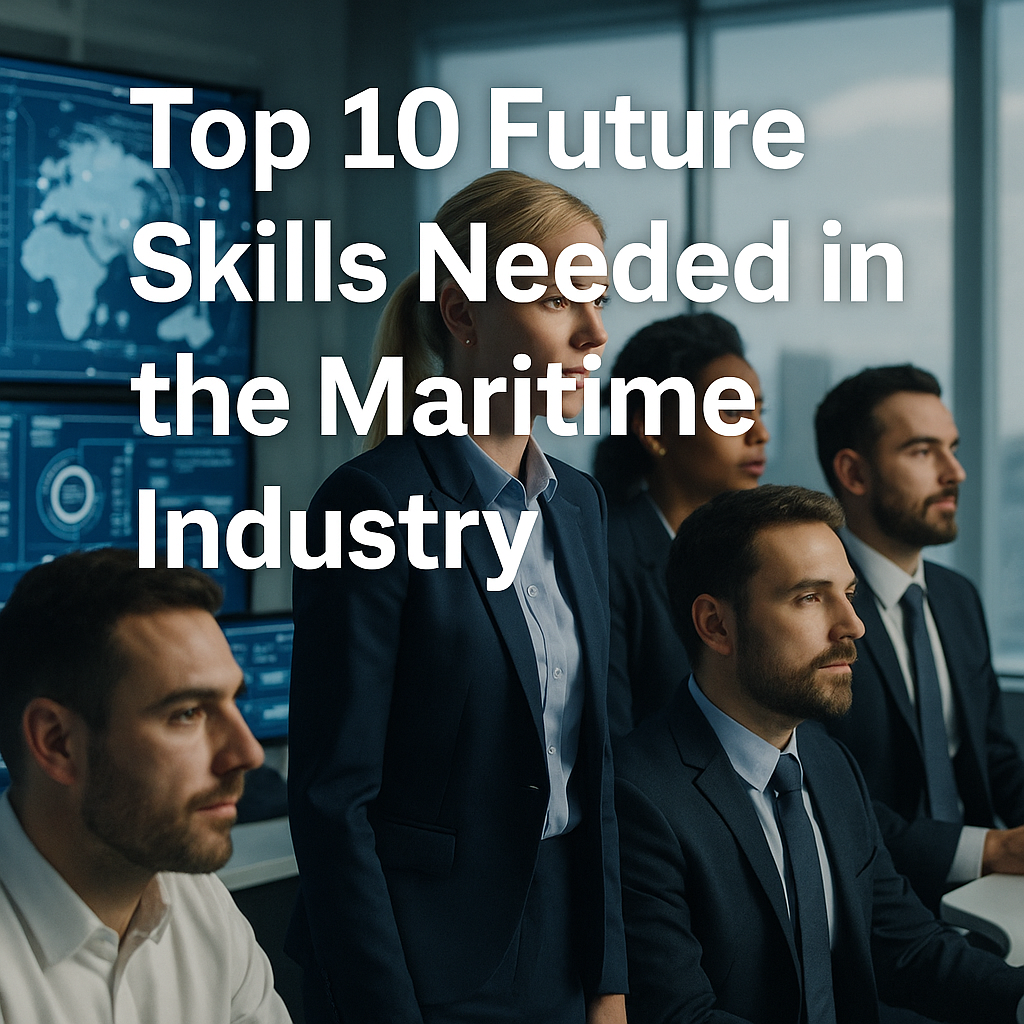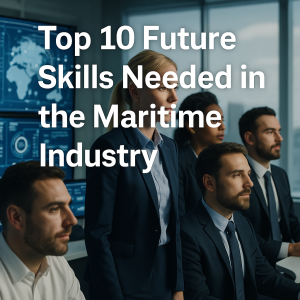Discover the top 10 future skills needed in the maritime industry. Learn how technology, sustainability, and automation are reshaping seafaring roles and maritime education for the next generation.
Why Future Skills Matter in Modern Maritime Operations
As the maritime industry undergoes rapid digital transformation and adapts to increasingly stringent environmental regulations, seafarers and shore-based professionals must evolve in tandem. From autonomous shipping to zero-emission vessels, future maritime operations will require a hybrid skill set that blends traditional seamanship with high-tech competency and environmental awareness.
The International Maritime Organization (IMO) projects that decarbonization, digitalization, and automation will redefine roles across the industry by 2030. Reports from Lloyd’s Register and DNV echo this, emphasizing the growing need for skills in artificial intelligence, cyber resilience, data interpretation, and sustainable operations.
The maritime world is no longer just about engines, anchors, and cargo. It’s about algorithms, emissions, and innovation.
Top 10 Future Skills Shaping the Maritime Workforce
1. Digital Navigation and E-Navigation Proficiency
Why It Matters: With the rise of smart shipping, mariners must understand digital route optimization, integrated bridge systems, and ECDIS beyond basic operation.
Real-World Application: Maersk Line utilizes AI-assisted navigation tools that rely on weather data, satellite positioning, and real-time analytics. Officers must interpret and respond to system recommendations safely and efficiently.
2. Cybersecurity Awareness and Protocols
Why It Matters: Maritime cyber threats have risen sharply in the past five years. In 2021, the IMO’s Maritime Cyber Risk Management in Safety Management Systems became mandatory.
Future Requirement: Crew and port operators must be trained in risk assessment, incident response, and system recovery to protect critical infrastructure from cyberattacks.
Supporting Data: The ICS reports a 400% increase in cyber incidents aboard vessels between 2020–2023.
External Link: IMO Cyber Risk Guidelines
3. Environmental Compliance and Green Engineering
Why It Matters: As the IMO targets net-zero emissions by 2050, skills in managing scrubbers, ballast water systems, and alternative fuels like LNG and methanol are vital.
New Roles: Green Officers, Fuel Efficiency Analysts, and Carbon Compliance Managers are emerging aboard ships and in ports.
Example: Wärtsilä’s hybrid propulsion systems require engineers trained in both mechanical and electrical systems, as well as regulatory compliance.
4. Remote Operations and Autonomous Vessel Management
Why It Matters: The development of MASS (Maritime Autonomous Surface Ships) introduces new operational paradigms.
Emerging Skills: Remote vessel monitoring, diagnostics, and intervention from onshore control centers will require cross-disciplinary fluency in IT, mechatronics, and maritime law.
Case Study: Yara Birkeland, the world’s first autonomous container ship, is monitored by a land-based crew—a preview of future operations.
5. Data Analytics and Maritime AI
Why It Matters: Big data analytics is driving optimization across fuel use, route planning, cargo stowage, and predictive maintenance.
Skillset: Mariners and fleet managers must learn to interpret dashboards, set KPIs, and apply machine learning outputs in real-time.
Analogy: Just as airplane pilots rely on automated systems but must understand underlying logic, so must ship officers manage algorithmic input.
6. Leadership in Multicultural and Technological Environments
Why It Matters: As crews become more diverse and vessel systems more complex, the ability to lead inclusively and adaptively is crucial.
Training Evolution: Modern maritime leadership training includes emotional intelligence, remote management, and resilience training.
Support: The Nautical Institute and ICS now emphasize human-centered leadership in their officer development programs.
External Link: Nautical Institute Human Element Resources
7. Maritime Law and Regulatory Compliance Literacy
Why It Matters: Officers must increasingly understand legal frameworks governing emissions, cyber liability, and autonomous navigation.
Example: Understanding how SOLAS, MARPOL Annex VI, and Paris MoU inspections intersect is vital for both ship compliance and avoiding detentions.
Future Role: Compliance Officers will act as liaisons between legal teams and technical crew.
8. Advanced Communication and Situational Awareness
Why It Matters: Situational awareness now includes interpreting radar overlays, real-time port instructions, and remote diagnostics in one interface.
Tools: GMDSS, VHF protocols, and Inmarsat integration remain essential, but must be complemented with digital literacy.
Scenario: During congested port arrivals, officers must balance automated alerts with voice communications and judgment—a true test of hybrid skills.
9. Innovation and Continuous Learning Mindset
Why It Matters: The maritime sector is evolving so quickly that static learning is no longer sufficient.
Industry Expectation: DNV recommends micro-credentialing and modular certification to enable seafarers to stay agile and employable.
Learning Platforms: Blended maritime education (e.g., simulators + e-learning) is becoming the norm across leading academies.
10. Port Logistics and Intermodal Supply Chain Understanding
Why It Matters: Integrated maritime logistics requires understanding not just shipping but how cargo interacts with rail, road, and data.
Skill Focus: Shore-based roles in logistics planning, digital twin modeling, and port call optimization will be in high demand.
Real-World Example: Rotterdam’s “Port of the Future” project uses AI, digital twins, and predictive ETAs—highlighting the skill shift from manual handling to smart logistics.
–
Case Study: Future Skills in Practice – The Port of Singapore
Singapore, one of the world’s busiest and most technologically advanced ports, exemplifies future skills deployment. PSA International, the port operator, has rolled out AI-based vessel planning, autonomous cranes, and digital twin systems.
Workers are upskilled through programs supported by the Maritime and Port Authority of Singapore (MPA), including courses in robotics, blockchain logistics, and advanced analytics.
Insight: These upskilling efforts resulted in a 28% reduction in turnaround time and a 15% boost in workforce productivity by 2023.
FAQ – Future Skills in the Maritime Industry
Q1: Will automation reduce the number of maritime jobs?
Not necessarily. While some manual roles may decrease, new roles in data, compliance, and automation will emerge.
Q2: What’s the most critical future skill for cadets?
Digital navigation and environmental compliance are now core competencies in most academies.
Q3: Are maritime academies adapting their curricula?
Yes. Institutions like WMU (World Maritime University) and U.S. Merchant Marine Academy have introduced new modules on cyber safety, AI, and sustainability.
Q4: Will AI replace captains?
Not in the foreseeable future. AI will assist but not fully replace the need for human judgment, particularly in emergencies.
Q5: What organizations provide training for future maritime skills?
The Nautical Institute, DNV, Lloyd’s Register, and IMO offer courses and certifications aligned with evolving industry standards.
Q6: Are future maritime skills relevant for shore-based roles too?
Absolutely. Roles in fleet management, port logistics, compliance, and maritime IT are increasingly in demand.
Q7: How can seafarers future-proof their careers?
Invest in continuous learning, seek hybrid certifications, and stay informed through platforms like IMO e-learning.
Conclusion: Sailing into the Future—Skillfully
The maritime industry’s transformation isn’t a storm to weather—it’s a tide to navigate. The skills needed today are not enough for tomorrow. Whether you’re a cadet, officer, shipowner, or maritime educator, the future demands a mindset of adaptability, continuous learning, and technological fluency.
Shipping isn’t just about horsepower and hulls anymore. It’s about algorithms, emissions targets, digital dashboards, and global cooperation. And those who master this new maritime toolbox will be the leaders of tomorrow’s fleets.
Invest in knowledge. Adapt with purpose. Navigate with foresight.


